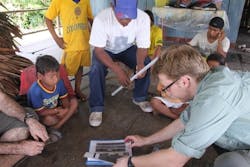About the author: Gabe Stonebraker is water/wastewater engineer for Dewberry. Stonebraker can be reached at [email protected] or 703.206.0811.
In June 2012, a group of George Mason University (GMU) students and faculty traveled to the Amazon jungle to help an indigenous group of roughly 400 people called the Maijuna complete a water, sanitation and hygiene (WaSH) project. The project included teaching proper toothbrushing, hygiene and handwashing, and building bio-slowsand filters (biosand filters) for each household.
Unfortunately, major flooding in the region crippled the team’s efforts, preventing it from building the filter. Only the sanitary and hygienic portions of the project were completed. On May 26, 2013, the Maijuna project team, with some old and new members, returned to the Sucusari River to complete the biosand filter project and follow up with the sanitary and hygiene lessons.
Biosand Basics
The Maijuna and the team determined biosand filters to be the best method for cleaning water for these Amazonian communities. Sand filtration is used throughout the water industry as a way to clean water. One type, called slow-sand filtration, uses a layer of biofilm that grows underneath roughly the first millimeter of sand to help remove bacteria that cause disease and diarrheal issues for humans. The water then passes through a layer of sand to remove other particulate matter to produce a relatively clear and clean water source that then usually goes on for further treatment. Many modern water treatment plants use this simple yet effective technology today.
A biosand filter uses the same concept, but is scaled down to fit inside a 30-gal food-grade plastic drum. Pipe and fittings are housed inside the drum, along with two layers of gravel, large and small, and a thick layer of sand for the filtration process. No pumps or chemicals are necessary. Biosand filters were selected for the Maijuna because of their size (one can fit inside a home) and because the necessary material sand can be collected by the families for free from a local river. The sand was tested and deemed extremely suitable for biosand filters.
Families were assigned to one of two teams consisting of a hygiene and filter group and two Maijuna. These Maijuna observed each session in order to become the local experts on filters and hygiene. By the end of the week, the Maijuna experts conducted the lessons. Each team saw, on average, two families a day for seven days.
Twenty-five filters were constructed with rapid results. After several buckets of water were flushed through the system upon completion (a bucket consisted of anywhere between 3.5 and 4.5 gal), the water began to flow significantly cleaner. The clarity of water from each filter continued to improve consistently as the week progressed.
Biological tests were conducted on filters ranging from one to five days old, as well as the test filter that was constructed in 2012. These tests concluded that the filter effluent had less biological content, even only a few days after construction and implementation. The quality of water the Maijuna now get out of the biosand filters is a significant and visible improvement from untreated river water. The group hopes to see measurable enhancements in the Maijuna’s health and decreased child mortality rates as a result of this project.
Optimistic Outlook
One of the last houses that the group visited had persistent problems with its filter when it was first built. There were many theories as to why the filter was not working properly, and the group tried several different techniques to fix the issue without rebuilding it. After much effort, the group decided to go back to the main village (30 minutes downriver), get new sand and rebuild the filter.
While the group was preparing to leave, Everest, one of the Maijuna who traveled with the teams, grabbed the inside piping and shook it from side-to-side. This released air pockets that had been trapped inside the sand layer that had slowed the filter’s flow to an unbearable rate. The level of determination and understanding of the filters shown by Everest helped solidify the GMU team’s hopes that the Maijuna will embrace the filters and hygiene lessons to improve their quality of life.
The Sucusari community was chosen from the four Maijuna villages as the pilot community for the biosand filters. If things go well with the Sucusari and the Maijuna accept biosand filtration as something that they will use consistently, then the program will grow to include the other villages. The Maijuna WaSH team is thrilled to have been able to help these incredible people with improving their quality of life through cleaner water and hygiene education.
Download: Here
